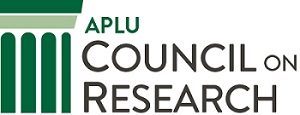
CoR NEWS
May 10, 2016
To: APLU Council on Research
From: APLU CoR Staff
- APLU-COGR Common Rule NPRM Comments Analysis Released
- 2016 CoR Summer Meeting Registration Now Open
- GUIRR Webinar (May 26)
- Science Article Highlights APLU Lab Safety Guide
- NSB Policy Brief on the Public Value of Higher Education
- Golden Goose Award Announcement
- Prize Competition: MForesight Low Volume Manufacturing
APLU and the Council on Governmental Relations (COGR), yesterday released a comprehensive review and analysis of 2,186 public comments on the Obama administration’s 2015 Notice of Proposed Rulemaking (NPRM) for revising the “Federal Policy for the Protection of Human Subjects,” better known as the “Common Rule.” The COGR-APLU analysis found that over 95 percent of patients and members of the research community were opposed to one or more of the major proposed changes. The analysis, as well as additional details on APLU’s ongoing engagement on human subjects protections regulation, can be found here on the APLU website.
This COGR-APLU analysis builds on the joint APLU-AAU responses to the 2011 Advanced Notice of Proposed Rulemaking (ANPRM) and the 2015 NPRM. As described in the APLU-AAU NPRM comment letter submitted in December of 2015, the proposed changes will substantially alter the conduct of research involving human subjects for decades to come. In moving from the NPRM to a final rule, federal agencies must take into account the concerns and recommendations submitted during the public comment period. Some provisions of the proposed rule may change based on public feedback. Thus, APLU joined this unique effort to understand the nature of all comments on the Rule, and explore whether the general and research publics believe the proposed changes to the rule will achieve their intended goal.
The proposed changes to the Rule are currently under interagency revision. A final rule is expected to be issued this fall.
Registration for the 2016 APLU Council on Research Summer Meeting is now open. The meeting will be held July 31 – August 3 in Morgantown, West Virginia. Meeting highlights include a pre-meeting workshop for new and future Senior Research Officers (SRO); a visit to and tour of the National Energy Technology Laboratory in Morgantown; a discussion with Dr. Kathy Partin, Director of the HHS Office of Research Integrity; and joint programming on August 2 with the APLU Council on Governmental Affairs (CGA).
CoR sessions offer the chance to learn from and share ideas with invited speakers and colleagues from across North America. 2016 session topics will include open and public access; research integrity; laboratory safety; the role of the SRO in research promotion and advocacy; science and the U.S. presidential transition; and engaging in and managing interdisciplinary research initiatives. Don’t miss our interactive follow-up session to Alan Alda’s Council of Presidents Luncheon Address at the 2015 APLU Annual Meeting. Laura Lindenfeld, Director of the Alan Alda Center for Science Communication, will lead the session describing the Center’s future plans and discuss the how campuses can affiliate with the Center.
We once again encourage each participating SRO to invite one Associate Vice Chancellor/President for Research, or future SRO, both to attend the meeting and participate in the pre-meeting “New and Future SRO” workshop – designed to build skills and address topics specific to this audience.
Visit the event website for registration and additional details.
The next webinar of the Government-University-Industry Research Roundtable (GUIRR) will be held on May 25, 2016 at 1pm. This webinar will focus on the U.S. Census Bureau’s Innovation Measurement Initiative, and features Ron Jarmin, Assistant Director of Research and Methodology at Census. Please register if would like to join this event.
Science Magazine highlighted APLU’s recently released lab safety guide in its May 4 article, “Urging Universities to Act on Safety.” The APLU Task Force on Laboratory Safety was convened last year by APLU and affiliated organizations, with leadership from the APLU Council on Research. The Task Force was designed to develop recommendations for strengthening a culture of safety on university campuses. From the article:
Recent weeks have brought good news and bad news concerning lab safety. The bad news, of course, is the 16 March explosion at the University of Hawaii (UH), Manoa, that severely injured a postdoc. The good news is an extremely useful new report titled A Guide to Implementing a Safety Culture in Our Universities. Both the report and a companion website were issued 11 April by the Association of Public and Land-grant Universities (APLU), whose members include 25 university systems and 207 universities in the United States, Canada, and Mexico.
The National Science Board (NSB, Board) released a new policy brief on the public and private benefits of the nation’s higher education institutions. The brief comes at a time when the “private” costs and private “returns” associated with higher education are a topic of frequent policy discussions. The NSB brief joins other recent reports, including the American Academy of Arts & Sciences’ Lincoln Project, in highlighting the broad public value of our higher education system to the nation and emphasizing the need for public investment in its research and educational missions. An accompanying “sense of the Board” statement underscores higher education’s value in fostering a civically engaged society.
We are delayed in congratulating Barbara Entwisle, Vice Chancellor for Research at the University of North Carolina, Chapel Hill and CoR Executive Committee member for her designation as a 2016 winner of the Golden Goose Award. This annual award, co-founded by groups including APLU, recognizes federally-funded research that initially may have seemed obscure, but ultimately yielded major breakthroughs applications. Dr. Entwisle will be recognized during the September 22 ceremony in Washington, D.C., for her work on the “The National Longitudinal Study of Adolescent to Adult Health,” along with her research colleagues, Peter Bearman, Kathleen Mullan Harris, Ronald Rindfuss, and Richard Udry.
As a reminder, the Golden Goose Awards accepts nominations year-round. Visit the nominations page if you know of research or researchers who should be recognized with this prestigious award.
MForesight announced the “Making to Manufacturing” competition to identify innovative solutions for cost-effective, low-volume manufacturing in lot sizes of 500-10,000 units in the United States. The Competition is seeking technologies in hardware, software, collaborative systems and educational tools that could, with 3-5 years of additional development, lower barriers to entrepreneurs and small businesses to increase the variety and value of items manufactured. The competition closes on June 1st, with winners in each category earning up to $10,000. Winners and high scoring applications will be invited to Washington DC to present their ideas to leaders in government and industry.
See the Competition Home Page for complete information.




Stay Connected
X (formerly Twitter)
Facebook
YouTube
LinkedIn
RSS